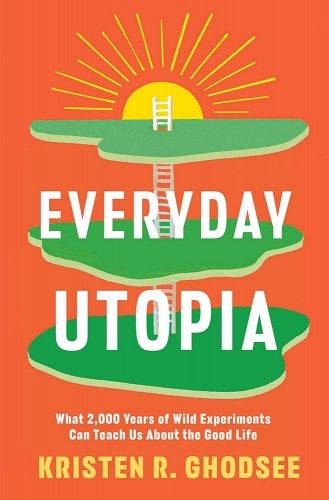sol2070 reviewed Everyday Utopia by Kristen Rogheh Ghodsee
One of the best non fiction of recent years
5 stars
( em português → sol2070.in/2025/02/livro-everyday-utopia-kristen-ghodsee/ )
In “Everyday Utopia” (2024, 352 pages), the north-american feminist anthropologist Kristen R. Ghodsee explores utopian ways of organizing family, relationships, and property in various intentional alternative communities, both historical and still existing today. Definitely one of the most interesting non-fiction books I’ve picked up in recent years.
The book analyzes everything from contemporary initiatives for shared housing and household items to reduce costs and foster support networks, to religious communities where everything is collective, as well as the political, cultural, and biological origins of both dominant and alternative family models, among many other topics.
For example, we commonly imagine the traditional family as something natural rather than as a structure with origins that are less biological and more cultural. The author discusses the Mosuo, a Tibetan community where authority is centered around grandmothers, and women own and inherit property through the maternal lineage. Relationships are open and free for both parties. The concept of “father” barely exists. For men, who live in their grandmothers’ homes, being a good uncle is what truly matters, as they help raise their sisters’ children. Since there is no formal marriage, couples form solely based on attraction. When they separate, there are no negative consequences financially, socially, or for the children.
As Ghodsee states:
"How very radical the Mosuo family structure seems to many of us today highlights just how deeply ingrained our own patrilocal and patrilineal traditions remain."
Alternative ways of thinking about and organizing family and child-rearing are a central theme of the book, especially considering the oppressive and unjust burdens the current model places on mothers and women. The communal upbringing of children is a common feature among many of the communities analyzed, an idea that was even formulated as ideal by Plato 24 centuries ago.
One of the reasons the author became interested in this topic is that, coming from a Puerto Rican-Persian background, she experienced financial and family hardships during her childhood and adolescence. A teacher helped her as if she were family, even providing her with housing and sponsoring her college admission — an act to which she credits her entire career. Personal stories like this make the book even more compelling. For instance, she also shares the professional challenges she faced when she became a mother.
A frequently referenced book is “The Dawn of Everything”, in which David Graeber and David Wengrow attempt to retell the history of human societies, debunking myths about inequality and progress. One of their conclusions is that ancestral communities and societies were limited only by their creativity in exploring different ways of organizing themselves. There was equality, inequality, accumulation, sharing, agriculture interwoven with foraging, and so on. Similarly, we are not trapped in today’s inequality and oppression — these are not a “natural progression” but merely another human invention.
I felt “Everyday Utopia” was a rich sibling book to “The Dawn of Everything” because it is filled with practical examples of intentional innovation and improvement in the ways humans organize socially.
Excerpts Below is a selection of highlighted passages, culminating in a fascinating subchapter on why Martin Luther King Jr. loved the TV series Star Trek.
“…we must understand that this kind of utopian thinking provides an invaluable intellectual tool. Even if dreams don’t come true, they do expand our imagination of what is possible and thereby reshape the landscape of what we can practically achieve (the so-called Overton window).”
“‘Utopia’ derives from the Greek roots for “not” and “place,” which means that “Utopia” references a “no place” or nowhere, although it is also a homonym for the word “Eutopia,” which means “good place.” This ambiguity was intentional.”
“As the French economist Thomas Piketty explains, “Every human society must justify its inequalities: unless reasons for them are found, the whole political and social edifice stands in danger of collapse.”
“… a general outline comes into view. Our ancestors were by no means always monogamous. Where monogamy did evolve, it may have done so for darker reasons than you’d expect. The nuclear family is not evolutionarily inevitable. Our contemporary mating practices are not “natural” or “unnatural,” “right” or “wrong.” Instead, the diversity, flexibility, and creativity around how we love, lust, marry, and raise our young has allowed humans to adapt and change over our evolutionary history. Family forms can respond to different demographic, environmental, or economic contexts, leading researchers on the evolution of human family forms to conclude that: “The cross-cultural empirical record supports that the family is a highly flexible social organization that is transiently, culturally and ecologically adaptable, a dynamic less transparent from traditional positions on patrilocality, patrilineality, and male parental care.”
“In a similar way to how we collectively believe in paper money, many of us also embrace the fiction that the way we organize our private lives is the only way available to us. Even if we understand in the abstract about the pressures parents face, the strain that child-rearing places on romantic relationships, the high divorce rate, the prevalence of child abuse and intimate partner violence, and the very real possibilities of our own or our partner’s long-term unemployment, disability, or death, we replicate the domestic form that makes us the most vulnerable to these problems because it is convenient and because that’s what everyone expects of us. Just as our entire economy rests on the fiction of what economists call a fiat currency, it also rests on a particular notion of the family, one that is often viewed as either natural or divinely mandated, but which acts to uphold a specific set of social and economic relations.”
Why Martin Luther King Jr. Loved Star Trek “I was born in 1970, a moment of sudden and unexpected challenges to the prevailing status quo. Wonder Woman’s creator introduced the Princess of Paradise Island during World War II, but it’s no coincidence that the image of the Amazon warrior also appeared on the very first issue of the explicitly feminist Ms. magazine in 1972 under the headline: “Wonder Woman for President.” Eleven years later, I watched my other screen heroine, forced to wear a now-iconic metal bikini, free herself from the tongue-waggling and blubbery Jabba the Hutt by strangling him with the very chain he had used to bind her to him. The University of Pennsylvania only fully integrated female undergraduate students into its School of Arts and Sciences in 1974, and yet today I teach there as a full professor and serve as the chair of my department. In some ways, both Wonder Woman and Princess Leia helped me to deal with the sexism I often encountered in my own life because I could imagine worlds where sexism didn’t hold women back. They were just fictional characters, but they made a difference. Although I am too young to have seen the original series while it was airing, another science fiction show has the distinction of being the longest lasting and most influential utopian vision that ever entered popular culture. When Star Trek began broadcasting in 1966, its creator, Gene Roddenberry, crafted a positive view of the future where humanity had overcome all of its conflicts and lived in a sort of galactic Pax Romana within something called the United Federation of Planets, “an interstellar union of different worlds and species with shared principles of universal liberty, rights, and equality.”44 In a 2011 interview, the late actress Nichelle Nichols (who played the African communications officer, Uhura, on the original starship Enterprise) recounted a story of her first meeting with the Reverend Martin Luther King Jr. at a banquet. King told Nichols that he was a huge fan of the show and that it was the only thing he and his wife allowed their children to stay up late to watch. At the time, Nichols intended to leave the show to pursue a career in the theater, but King insisted she had to stay. Nichols recalled: “He said I had the first nonstereotypical role, I had a role with honor, dignity and intelligence. He said, ‘You simply cannot abdicate, this is an important role. This is why we are marching. We never thought we’d see this on TV.’ ”45 For the first generation of Black Trekkies, Nichols’s portrayal as an officer on the bridge of the interracial starship Enterprise helped them envision the possibility of equality. “When I was a little girl,” explained the actress Whoopi Goldberg in 2014, “it was like, ‘Oh, we Black people are in the future.’ Uhura did that for me.”46 “Imagination is more important than knowledge,” said Albert Einstein in 1931. “For knowledge is limited, whereas imagination embraces the entire world, stimulating progress, giving birth to evolution.”47 We stand on the cusp of a new age, with many of us striving toward a more positive vision of the future like the one Roddenberry once provided, where human beings find a way to build a better world for subsequent generations of humanity. Our old ideas about patrilineality and patrilocality are no longer fit for that purpose. We need new ideas, new dreams, and the courage to imagine alternative futures. Now is the moment to “think different.” If we can imagine them first in a galaxy far, far away, it’s only a matter of time before we boldly go and begin figuring out how to translate these inspired visions into our own everyday utopias.”

